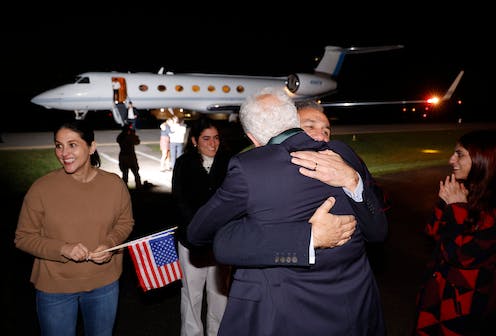
Freed U.S. nationals released in a prisoner swap deal between the U.S. and Iran disembark from an airplane at Fort Belvoir, Va., on Sept. 19, 2023. Jonathan Ernst/Pool/AFP via Getty Images
Five Americans held as hostages by Iran have been returned to the United States following a political deal in which President Joe Biden agreed to unfreeze US$6 billion in Iranian funds held in South Korean banks in exchange for the prisoners.
Hostage-taking has been frequently used by both states and insurgent groups as a means to extract funds or concessions from more powerful states. Iran took 52 American diplomats and citizens hostage in 1979 and held them for over a year.
In recent years, foreign citizens have been taken hostage in countries such as Nigeria, Papua New Guinea, Afghanistan and Iraq.
As a political philosopher, I am interested in the morality of using funds to secure the release of hostages. The appeal of doing so is powerful, but the long-term moral costs of acceding to the demands of hostage-takers is frequently even more significant.
Moral reasons to pay − and to worry about paying
There are some powerful moral reasons to argue that trading money for hostages is morally defensible. Eighteenth-century philosopher Immanuel Kant takes the fundamental tenet of morality to be that human beings are ethically distinct from goods, such as money. Under this lens, Biden may have done the right thing by choosing to give up money in exchange for the safety and liberty of these hostages.
The payments may also be justified with reference to the moral purposes of the state itself. If the central job of any political government is to protect its citizens, then a government that did not work to repatriate its citizens held abroad might be seen as failing to do its job.
However, strong arguments can also be brought to bear against the practice of paying for the release of hostages. Utilitarian philosophers argue that public policy ought to focus on maximizing human happiness and well-being – not simply now, but over time. If hostage-takers are rewarded, it is entirely possible that they will choose to take more hostages in the future.
U.S. Secretary of State Antony Blinken speaks during a news conference as he announces that five Americans had been freed.
Craig Ruttle/Pool/AFP via Getty Images
The release of $6 billion to the government of Iran will bring significant benefits for the present hostages and their families. It may also, however, ensure a stream of future hostages, for whom similar ethical calculations must be made.
Paying now − and in the future
There are further ethical worries that stem from the use of that $6 billion. Any group that is willing to take hostages could well engage in other morally questionable practices as well.
The government of Iran, for instance, has come under recent criticism for its financial support for violent, nonstate, regional agents – including, notably, Hezbollah, designated as a terrorist group by both the United States and the European Union. Additionally, there are allegations that Iran provided military support to Russia during its ongoing war against Ukraine.
Within its own borders, Iran has come under increased scrutiny for its domestic record on human rights – which includes the extrajudicial killings of protesters, including children.
The Biden administration has been quick to assert that the money will be used by Iran only for humanitarian purposes. Nonetheless, the influx of such a significant amount of funds seems likely to increase Iran’s overall strength and ability to act in favor of its aims.
Such aims may come with significant risks of violence and destabilization, given the ways in which Iranian money has been used in the past to support violent, nonstate agents throughout the Middle East.
The short-term benefits to the hostages and their families must be weighed against these long-term effects.
Whose lives are more valued?
These future risks, moreover, are often given less weight than is appropriate, because of the natural human tendency to focus on the present and the particular over the uncertain.
Philosophers such as Peter Singer have criticized governments that choose to spend large sums to rescue particular people, when such money might have saved more lives if directed elsewhere.
To take one example: Governments routinely spend great sums to rescue people lost at sea – including the wealthy travelers who chose to voyage to the Titanic on a submersible that proved to be unsafe. The money devoted to that rescue operation would almost certainly have saved more lives were it devoted to other purposes, such as public health or development aid.
Medical ethicists such as Dan Brock have argued that this difference in attitude reflects irrationality rather than ethics. There is no moral difference between the death of a specific and known person and a statistical death in the future. Policymakers act wrongly by ignoring the latter in favor of the former.
The same conclusions seem appropriate for policymakers using funds to rescue hostages when those funds are likely to make violent agents more powerful. If the money provided to save one life causes the deaths of more lives in the future, those paying the money have – if Singer and Brock are correct – acted wrongly.
The absence of simple answers
The question of whether to pay for the release of hostages is a difficult one, and there is no single answer that does not raise significant ethical challenges.
The practice of hostage-taking, moreover, seems to be on the rise, with an estimated 580% increase in American citizens taken hostage abroad in the past eight years.
There is no single reason for this increase; it reflects factors as diverse as a growing hostility toward international humanitarian norms and an increased willingness by authoritarian states to directly target foreign journalists. These factors, sadly, are unlikely to improve in the near future.
At the very least, if a state chooses to pay for the release of its citizens, I believe, it must do what it can to mitigate the harms wrought by that payment – including, most importantly, making some significant effort to prevent hostile powers from taking hostages in the first place.
Michael Blake receives funding from the National Endowment for the Humanities.
Advertisement

Advertisement
Contact Us
If you would like to place dofollow backlinks in our website or paid content reach out to info@qhubonews.com











